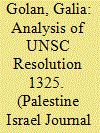|
|
|
Sort Order |
|
|
|
Items / Page
|
|
|
|
|
|
|
| Srl | Item |
| 1 |
ID:
175779


|
|
|
|
|
| Summary/Abstract |
United Nations Security Council Resolution 1325, enacted in 2001, called for (and was designed to encourage) countries to include women in decision-making regarding war, peace, and security. The demand was based on three principles. The first of these was the principle of equality, according a right enshrined in democracy. Women should be included simply because they are a major part of the citizenry and, therefore, have a right to participate in such important decision-making. The second principle was that women are the main victims of war and, as such, they should have a say in decisions that will actually have a great effect on them. The third principle was that women bring something unique to the table.
|
|
|
|
|
|
|
|
|
|
|
|
|
|
|
|
| 2 |
ID:
175781


|
|
|
|
|
| Summary/Abstract |
The United Nations Security Council unanimously passed Resolution 1325 on October 31, 2000. This resolution, which focuses on women, peace, and security, calls on member states to “protect women and girls from gender-based violence … in situations of armed conflict;” “adopt a gender perspective” when “negotiating and implementing peace agreements;” increase women’s participation at decision-making levels in conflict resolution and peace processes;” and increase women’s representation “at all decision-making levels in national, regional, and international institutions and mechanisms for the prevention, management, and resolution of conflict.” In this article, I consider how these different imperatives have been addressed in the Palestinian-Israeli context. In particular, I will focus on the 1967 territories and on the response of the Palestinian Authority (PA) to the resolution.
|
|
|
|
|
|
|
|
|
|
|
|
|
|
|
|
| 3 |
ID:
177852


|
|
|
|
|
| Summary/Abstract |
In 2000, the United Nations Security Council Resolution 1325 on Women, Peace and Security recognized an urgent need to mainstream a gender perspective into peacekeeping operations in order to achieve gender equality. UN member states have been called upon to implement the Resolution through National Action Plans. Almost two decades after its adoption, research indicates that progress towards the goals set in Resolution 1325 has been slow. This article builds on the case of the Chilean military to assess whether and to what extent a gender perspective has been incorporated into the country’s peacekeeping practice. We argue that gender stereotypes have persisted despite Chile’s status as a regional pioneer in promoting gender equality in its defence policy. Paradoxically, the new opportunities peacekeeping offered for women in the military have been legitimized by a discourse that conforms to traditional gender stereotypes, such that women serve as the ‘peaceful and friendly face’ in peacekeeping.
|
|
|
|
|
|
|
|
|
|
|
|
|
|
|
|
| 4 |
ID:
175775


|
|
|
|
|
| Summary/Abstract |
For Israeli and Palestinian women activists, the adoption of United Nations Security Council Resolution 1325 on October 31, 2000, was the culmination of intense efforts to introduce gender directly into the promotion of peace, the protection of civilians (especially women and children) in protracted conflicts, and the prevention of further escalation. Twenty years later, this landmark resolution still stands as a beacon in the dual struggle against militarism and patriarchy, although its goals have yet to be realized. How has 1325 been used in the context of the Israeli-Palestinian confrontation during the past 20 years? Why have efforts to advance its core precepts largely faltered to date? And where can feminists devoted to a just and durable end to the Palestinian-Israeli conflict go from here?
|
|
|
|
|
|
|
|
|
|
|
|
|
|
|
|
|
|
|
|
|